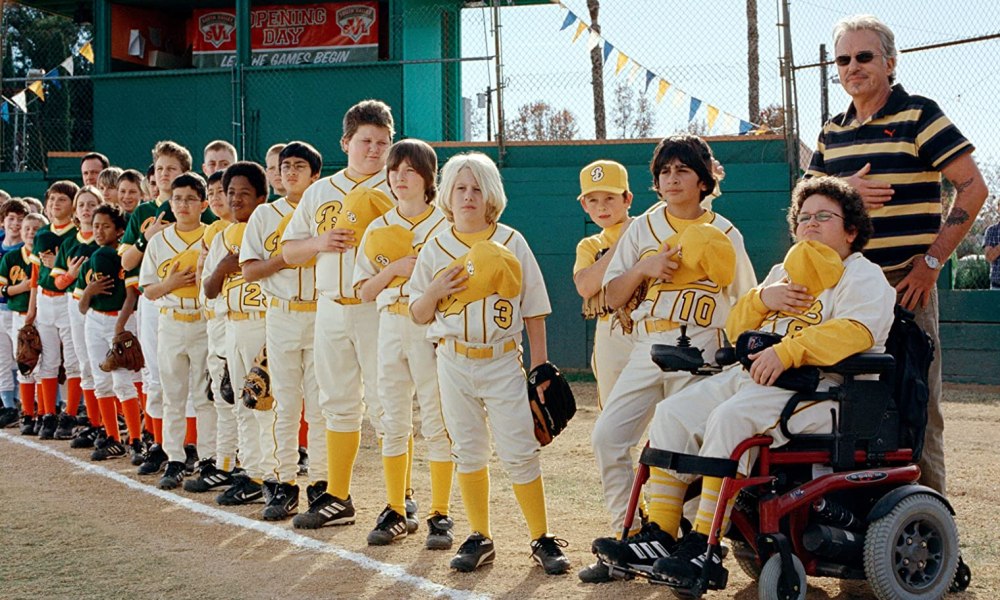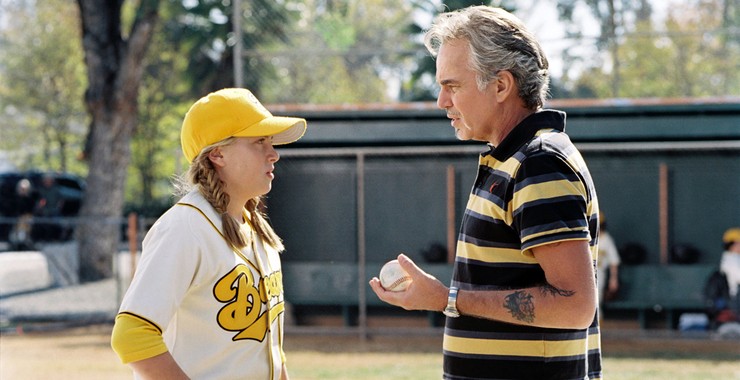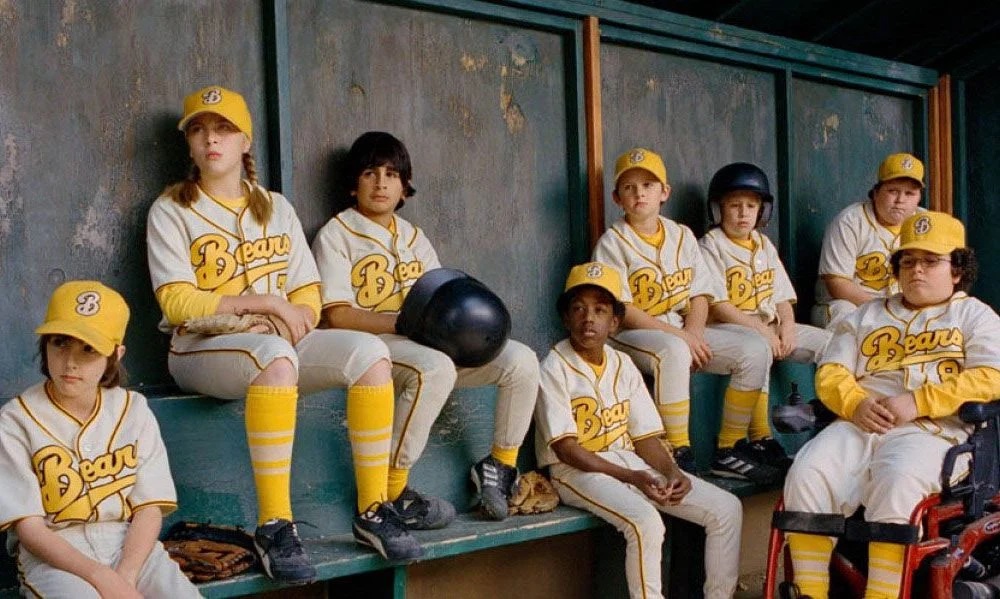“Bad News Bears” is available to stream on YouTube, Prime Video, and most other streaming platforms.
In 2005, Richard Linklater helmed a remake of the 1976 baseball film starring Walter Matthau, “The Bad News Bears.” Linklater’s version (sans the word ‘the’), had Billy Bob Thornton on the lead; and with just a few changes in the story, went on to become a fairly faithful remake of the Bill Lancaster-penned classic.
And while for the most part faithful adaptations are a good thing, they usually end up stuck in the shadows of their predecessors.
Similarly, while Linklater had every bit of good intention for this remake, “Bad News Bears” is yet another entry to the long list.
Thornton’s Buttermaker a Delight in This Film
“Bad News Bears” introduces us to Morris Buttermaker (Thornton), an exterminator working on a woman’s basement. As the mother prepares lunch for her kids, we see Buttermaker emerge followed by countless rats. He’s a Pied Piper incarnate; but instead of flute, Buttermaker’s holding a can of beer.
While at work. In broad daylight.
(At this point audiences are reminded of another Thornton film released just two years prior, Bad Santa. That’s a film where he dresses up as Santa Claus by day to rob the department store at night—while he drinks himself to death in between and on the job.)
Job halfway done, Buttermaker bails and drives to the baseball field nearby. Here he meets with Liz Whitewood (Marcia Gay Harden), an influential figure in the neighborhood who wants her son Toby to excel in baseball. He also meets Ray Bullock (Greg Kinnear), a coach of the baseball league’s defending champions who claims to be a fan of the Buttermaker’s earlier career.
A smug elitist, Bullock bristles at the thought of having the league open to all children. He believes that closing off the league only to those who play well can help the children develop their skills better.
On the other hand, Buttermaker, tasked to find sponsors for the team’s uniforms, strikes a deal with the local strip club, having its name etched at the back of the children’s jerseys.

A Herculean Task to Coach a Bad Children’s Baseball Team
We get to understand Whitewood’s (and probably everyone else’s) tolerance to Buttermaker’s idiosyncratic, hedonistic behavior. He is a washed-up baseball player who once suited for the Seattle Mariners as pitcher. That stint, however, didn’t last long. By his own admission, Buttermaker attacked an umpire that got him kicked out of professional baseball. That, along with his hedonism and womanizing, sped his downward spiral a little further.
Which begs the question: Is the team Buttermaker would coach any good?
Putting it simply: To say they are bad is a massive understatement.
These are a collective of misfits—physically, emotionally, and even racially. One of the kids is even wheelchair-bound—just a headcount to round off the team. But more importantly, they don’t know the basic fundamentals of the game.
And they’re all hoping to learn something from a drunk, womanizing has-been who puts the dead rats in his watercooler…before emptying it to make way for his canned beers.
As expected, the team’s (named the Bears) first match against the Bullock-coached Yankees didn’t end well. Without the skills and a coach sober enough to teach the game, the Bears didn’t even score; forcing Buttermaker to forfeit the game.
“What do you think, Lupus?” Buttermaker asks one of his oft-fumbling players.
“Sometimes,” Lupus replies. “Bird poop tastes like candy.”
It would take a conversation with a few of his players, along with a visit to his daughter from one of his ex-girlfriends, for Buttermaker to actually give a damn. And with the addition of Kelly Leak, a local troublemaker but solid hitter, the Bears begin to put everyone on notice.
Suddenly, Buttermaker’s mantra grows on the children:
“Who we’re gonna play next?”
“The Angels.”
“That’s bad news for the Angels.”

“Bad News Bears:” The Merits of Faithful Film Remakes (or Lack Thereof)
I appreciate how the screenwriters changed the dynamic between troubled coach and the female player, Amanda. By turning her character into Buttermaker’s estranged daughter, the filmmakers gave Sammi Kane Kraft a big wiggle room to channel the emotions of hatred, disappointment, and spite of a daughter who only wanted a father’s love—or his mere presence as the bare minimum. It’s just heartbreaking that Kraft, who died in 2012 at the age of 20 following a car crash, could’ve given us more of her arts; whether as an actress, a musician, or a baseball player.
Having that said; I understand the undercurrent of frustration when the film opened 16 years ago. By trying to capitalize on Thornton’s mastery of the grizzled, devil-may-care slacker character, the filmmakers settled on a pale retread of “The Bad News Bears” and simply infused it with “Bad Santa.” Even the overall narrative arc was the same. The end product, no surprise here, is a facsimile: It captures what the source provided, but paler, and of lesser quality.
Not that it probably mattered in the end; but this film not written by Linklater might have played a factor in the film’s overall quality. “Bad News Bears,” unsurprisingly, was the creation of Glenn Ficarra and John Requa. These are the same guys who wrote “Bad Santa.”

“Bad News Bears:” A Guilty Pleasure of a Sports Film
Make no mistake, though: I like “Bad News Bears.” I admire the heart of this remake, and Linklater casting Thornton in the lead honestly is a genius decision. Yes, he might’ve been the ‘Bad Santa’ to the audiences up to that point; but his turn as Morris Buttermaker arguably blows the late Matthau’s take out of the water.
In the end, however, I chalk “Bad News Bears” under my guilty pleasures. This is a sports film that can grow on a casual moviegoer, provided that said audience doesn’t have an idea of the source material it was from.
“Bad News Bears,” for all its intents, is just another example of an all-too-faithful remake of a classic. Sure: it’s delightful, it’s warm, and it’s got heart. And with Thornton making the role his own, Linklater actually succeeds in that regard. Unfortunately, with the filmmaker’s effort to capture the heart of the original, the film sputters to find its own soul.


